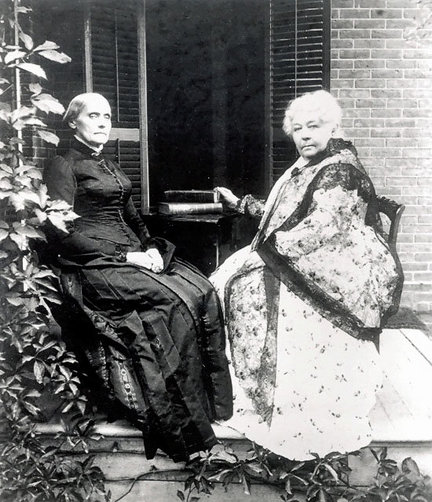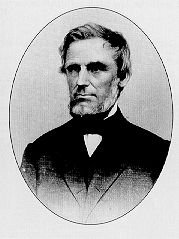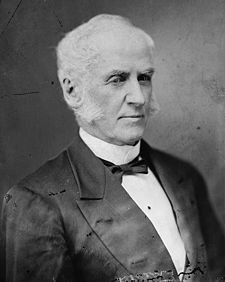

“If you refuse us our rights as citizens, I will bring charges against you in Criminal Court and I will sue each of you personally for large, exemplary damages!I know I can win. I have Judge Selden as a lawyer.
There is any amount of money to back me, and if I have to, I will push to the ‘last ditch’ in both court…s.” – Susan B. Anthony to Registrars of Rochester’s 8th Ward, her home town, as she attempted to vote (November 5, 1872). She was joined by her three sisters and suffragettes totaling 50.
***
She was not glamorous. She wore dark clothing. No photographs depict her smiling. In today’s media, given the same circumstances, she would have been skewered by political analysts. She would have received death threats. She would have been called liberal and she would have been criticized ubiquitously in every medium, by men and women.
In a barber shop in Rochester, NY 138 years ago today, Susan B. Anthony demanded that she be given a ballot. Her vote on that fall day would challenge the establishment, our government and perhaps most importantly, Anthony’s tenacity and commitment to a cause that she would not see satisfied in her lifetime.
***
Susan B. Anthony was 32 when she attended the National Women’s Rights Convention in Syracuse, New York, four years after Stanton and Mott’s Seneca Falls Convention. TWENTY Years later, she was arrested in Rochester, New York for illegally attempting to vote. She stood firm that the 14th Amendment “all persons born and naturalized in the United States…are citizens of the United States,” and as citizens were entitled to the “privileges” of citizens of the United States, ie. voting.
What most women don’t realize is that women HAD the right to vote, but as the Constitution of the United States was being adopted, and criteria to vote was being determined, women were disenfranchised. Between 1777-1807, New York, Massachusetts, New Hampshire, and New Jersey all voted and

passed laws that outlined voting rights. One of the more scandalous issues came in 1806 with the proposal of a new Essex County courthouse which was located in Newark. Residents of Elizabethtown also wanted the courthouse. To make it “fair”, the New Jersey Legislature ordered the outcome to be determined by a vote and it was UGLY. It was “suggested” that women and girls voted more than once, but many of the “women” were actually men in disguise. I’m sure there were a few women who felt their vote was important, but at that time, they were not vocal about it. Most history books suggest women were indifferent, perhaps because they had little freedom themselves, even with a vote.
It would be 66 years later, in 1872 that Susan B. Anthony would vote and be tried on a Federal charge. She refused to pay the bail. Her friend Judge Selden paid it. Seven months later, the trial began on June 17, 1873 with presiding Judge, Ward Hunt. The U.S. District Attorney, Richard Crowley laid out the court’s case, “Miss Susan B. Anthony . . . upon the 5th day of November, 1872, . . . voted. . . . At that time she was a woman.” Source: Women’s Rights on Trial, 1st Ed., Gale, 1997, p.312.
When Selden, Anthony’s lawyer, called her to the stand, “Crowley objected, saying (since she was a woman), “She is not competent as a witness in her own behalf.” Selden took the stand instead.”
According to the Elizabeth Cady Stanton & Susan B. Anthony Papers’ Project at Rutgers University, there are three accounts of Anthony’s comments following her guilty verdict. My favorite is the second one:
As a matter of outward form the defendant was asked if she had anything to say why the sentence of the court should not be pronounced upon her.

“Yes, your honor,” replied Miss Anthony, “I have many things to say. My every right, constitutional, civil, political and judicial has been tramped upon. I have not only had no jury of my peers, but I have had no jury at all.”
Court—”Sit down Miss Anthony. I cannot allow you to argue the question.”
Miss Anthony—”I shall not sit down. I will not lose my only chance to speak.”
Court—”You have been tried, Miss Anthony, by the forms of law, and my decision has been rendered by law.”
Miss Anthony—”Yes, but laws made by men, under a government of men, interpreted by men and for the benefit of men. The only chance women have for justice in this country is to violate the law, as I have done, and as I shall continue to do,” and she struck her hand heavily on the table in emphasis of what she said. “Does your honor suppose that we obeyed the infamous fugitive slave law which forbade to give a cup of cold water to a slave fleeing from his master? I tell you we did not obey it; we fed him and clothed him, and sent him on his way to Canada. So shall we trample all unjust laws under foot. I do not ask the clemency of the court. I came into it to get justice, having failed in this, I demand the full rigors of the law.”
Anthony’s request for a new trial was denied and she was ordered to pay a fine of $100.
Anthony responded, “May it please your honor, I will never pay a dollar of your unjust penalty. . . . ‘Resistance to tyranny is obedience to God.'”
Hunt did not order her jailed, but released her, saying “Madam, the Court will not order you to stand committed until the fine is paid.”
Susan B. Anthony never paid her fine and continued to agitate the male establishment until her death in on March 13, 1906.


